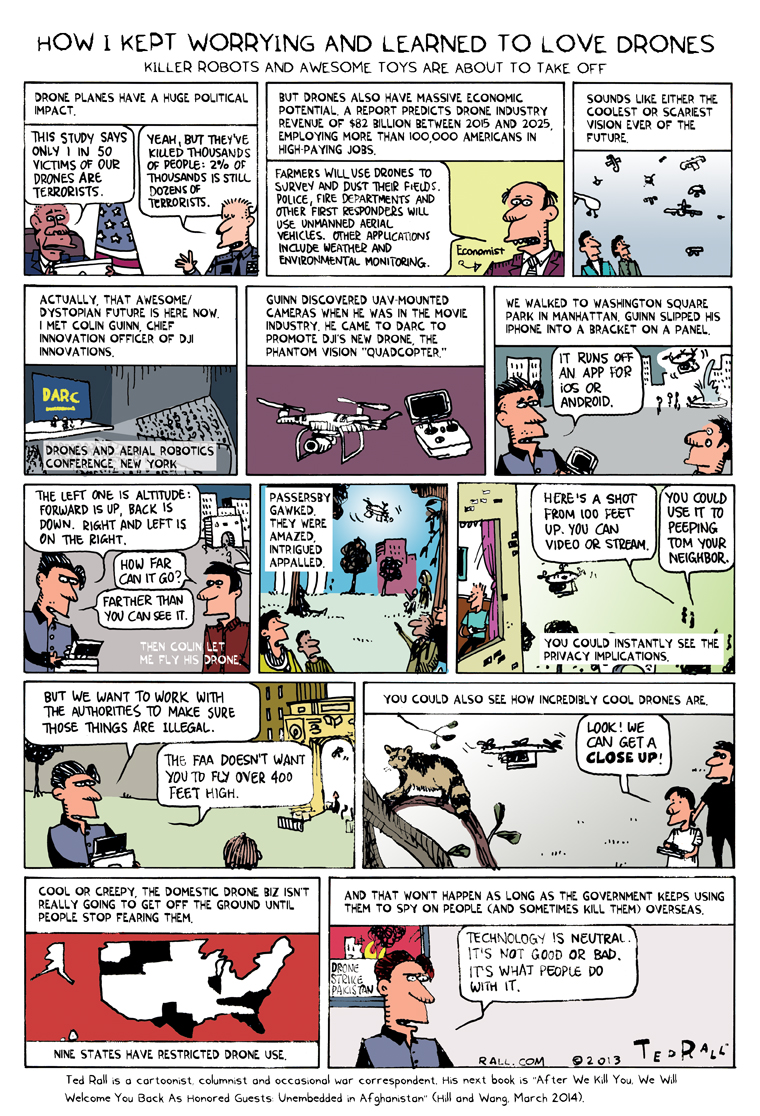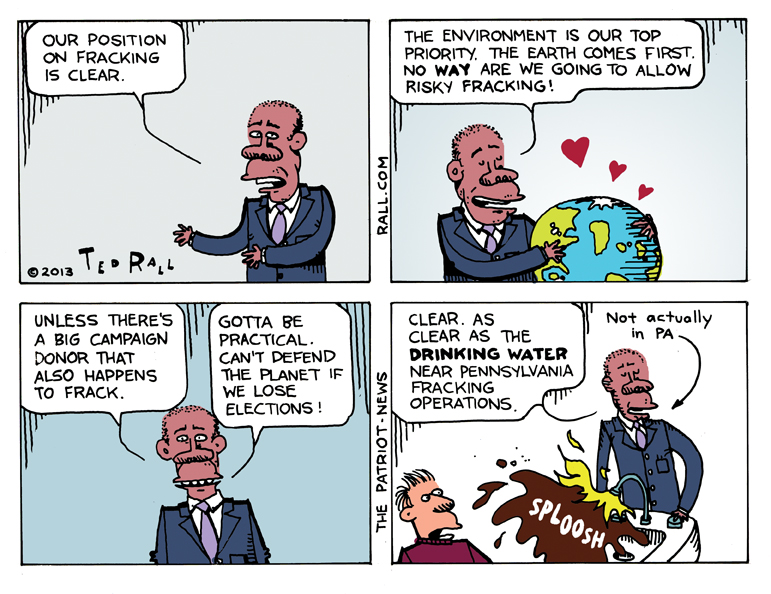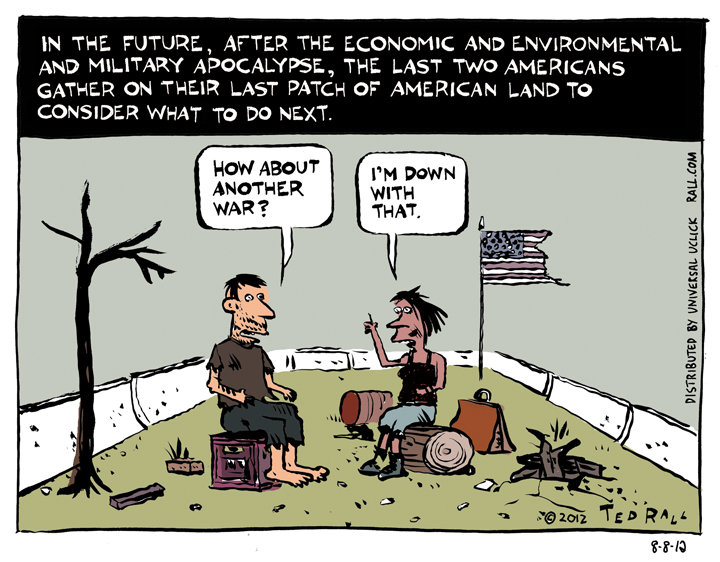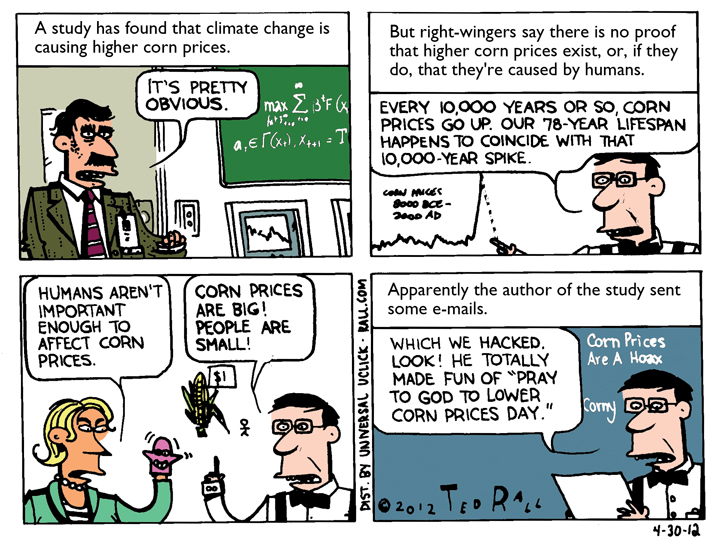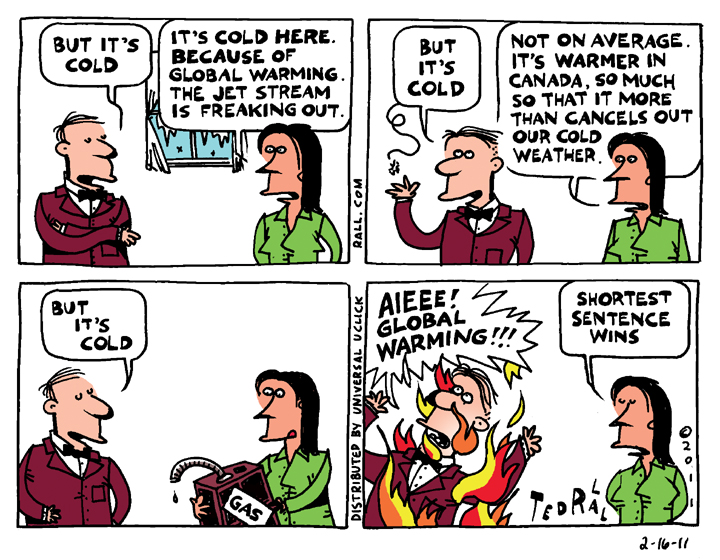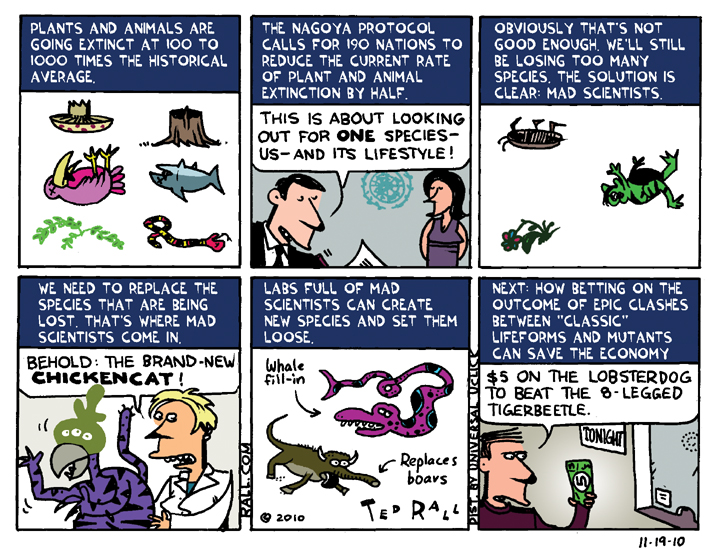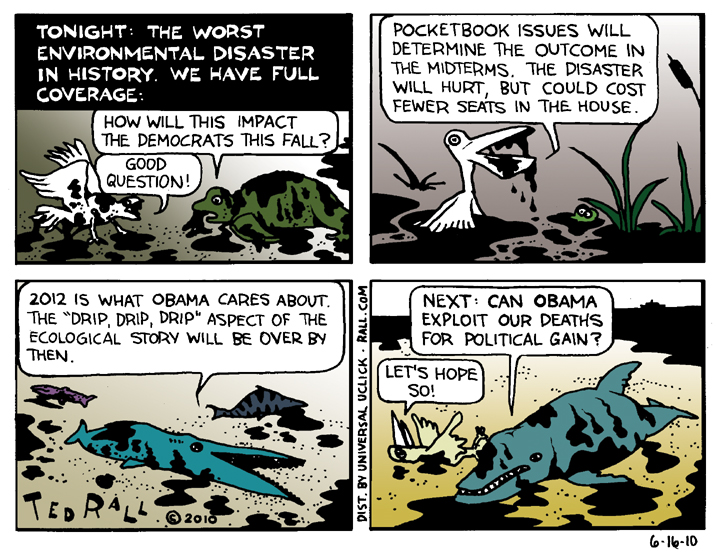I attended the Drone and Aerial Robotics Conference at New York University. I was terrified of drones…then I got to fly one myself. This is a long-form cartoon I drew for The Los Angeles Times op/ed page.
SYNDICATED COLUMN: The New Generation Gap: Gen X vs. Gen Y

The Gen X-Millennial Generation Gap
Every 20 years ago, Time depicts people in their 20s as “lazy, entitled, selfish and shallow.” This time the target is the Millennial generation (Americans born between roughly 1980 and 2000, with Baby Boomer parents). According to (cough cough) the Boomer-run media, twentysomethings/Gen Y/Millennials are narcissists.
Whatever.
Back in 1990, Time was smearing Gen X as shallow, apolitical, unambitious shoe-gazers.
“[Gen Xers] have trouble making decisions. They would rather hike in the Himalayas than climb a corporate ladder. They have few heroes, no anthems, no style to call their own. They crave entertainment, but their attention span is as short as one zap of a TV dial. They hate yuppies, hippies and druggies. They postpone marriage because they dread divorce. They sneer at Range Rovers, Rolexes and red suspenders. What they hold dear are family life, local activism, national parks, penny loafers and mountain bikes.” (Penny loafers? Really?)
Back then we Gen Xers defended our collective honor by alternating between the “we do not suck, at least not in the way you say we suck” and “anyway, if we do suck, it’s your fault, old farts” arguments. Gen Y is manning its rhetorical ramparts the same way.
Here we go again.
Sort of.
You know what’s wrong with young people today?
Not much. Not according to me or my friends. We’re fine with younger people.
Which is weird.
Gen Xers get along well with people in their 20s and 30s — certainly a lot better than those in their 40s did with us when we were young.
We like Gen Y. We respect them. We don’t chafe, for example, at working under a younger boss. We ask them advice. OK, mostly about tech stuff. I learned about WordPress and Hootsuite and Gawker and Wii from 20ish friends. Mostly, we like the same music and movies. (But they download stuff. Don’t they worry about ephemerality?)
Maybe the Millennials secretly hate us — you’d have to ask them — but if they do, they’re doing an excellent job of hiding it. We hang out. It’s good.
Sometimes, though — it’s not like it comes up a lot, just now and then — my Gen Xer cohorts let slip a complaint about our younger friends and colleagues:
Why are Millennials, um…well, there’s no other way to say it: kind of boring?
Young people today! So obedient. They believe politicians. What’s with that? Millennials go along to get along in corporate America. When they get laid off, they don’t get angry (like we did) — they adapt. They reinvent themselves. Gen Y music, movies, even their clothes: so conservative!
The Generation Gap of the 1960s and 1970s referred to the inability/refusal of “tune in, turn on, drop out” Baby Boomers to relate to their stodgy “we survived the Depression and won World War II so turn down that goddamn rock ‘n’ roll” Parents. Though decried at the time as sad and alienating, the dynamic of that demographic divide was as natural as could be. The young were loud, obnoxious, demanding and politically radical. The old were reserved, quiet and conservative, even reactionary. Kids were kids; parents were parents.
William Howe and Neil Strauss’ landmark book “Generations,” which traces the identities of American generation through popular culture and politics back to the colonial era, depicts dozens of epic clashes between old codgers vs. youthful insurgents. The young fight to be heard. The old yell at them to shut up. The old get older and quieter, the young mature and gain influence and replace them.
That’s how it was 200 years, and 20 years, ago. Just as their parents looked down on them, Boomers looked down on us Xers.
The Gen X/Y divide breaks this pattern.
We’re middle-aged and cynical and our tastes run to smart and sarcastic and anti-PC and antiauthoritarian, Tarantino/postpunk. We voted Green Party and never looked back, or for Obama but never expected much. Millennials are old and naïve and earnest and retro.
Millennial hipsters (who don’t dress hip — their hipsters are dorks) are militant nostalgists. They’ve revived the ancient traditions of our grandparents: martinis, old-fashioned cocktails like grasshoppers and mint juleps and, well, old fashioneds. They golf. They wear clothes from the 1930s. They watch go-go dancers. (Feminist radical lesbian ones.) They grow beards — not hippie beards, but retrosexual Civil War ones, paired with handlebar mustaches. They open restaurants — really good restaurants — whose menus and aesthetics harken back to the 19th century, staffed by waiters who take everything very seriously. You can elicit a dry chuckle. Not a bellylaugh. Certainly not a snide Xer sneer.
Steampunk could never have been a big Gen X thing. We’re scrappy and stripped down. They’re baroque.
Millennials didn’t just expect real Hope and Change. Four years later, they still do. When they got radical, they came up with the blink-and-you-missed it Occupy movement, which had as its centerpiece calls to reenact the Glass-Steagal Act.
Millennial pop culture is about flat affect: mumblecore movies and all-attitude-no-plot TV shows like “Arrested Development,” emo-influenced music, giant dollops of special nostalgia sauce everywhere, every member of every band dressed like they’re showing up to roof your house (but with Taliban beards). Opening concert greeting: “Hey.”
Graphic novels where it takes six pages for a leaf to fall off a tree.
Prose novels about nothing, printed preciously and packaged beautifully, thanks to the influential McSweeney’s empire.
Gentle, chatty movies and TV shows, not a series of scenes, but rather riffs of tone and mood.
Even their taste in cars is boring. And kind of dumb.
Boomers’ countless faults aside, let’s give them this: they knew what they wanted. They loved. They hated. They wanted revolution. Which was one of the things Xers hated about Boomers (Xers hate a lot): they came so close to revolution and they friggin’ gave up. Gen Y revolution? It’s hard to imagine such an — oblivious? unaccountably satisfied? — generation shooting anyone or blowing anything up. That, I think, gets close to the mystery of the Millennials. They’ve been horribly screwed — even more than us Gen Xers, and make no mistake, we were hosed big time.
Millennials are mired in student loan debt.
They will never make much money or get any government benefits or get much of anything out of the system.
After decades of warnings, the planet is finally, really, irreversibly, ruined. Their planet.
Why aren’t they pissed off?
(We need them to be. We’re too busy holding down four jobs.)
Parents, they say, shouldn’t have to bury their own children. It ain’t natural. Know what else is wrong? For the old to see the young as uptight codgers.
Not that Xers blame Yers for being uncool. Gen Xers, a self-deprecating generation from the beginning (what do you expect? society, politics, even the movies hated us — remember all those evil child horror movies like The Omen and It’s Alive?)
Writing in The New York Observer, Peter Hyman argues that Gen X and Gen Y shouldn’t be as cozy as they are. That it’s our (X’s) fault that Y hasn’t made its own mark:
“The old generational identities that once defined us have broken down, and the net result is a messy temporal mashup in which fortysomethings act like skateboarders, twentysomethings dress like the grandfather from My Three Sons, tweens attend rock concerts with their parents and toddlers are exposed to the ethos of hardcore punk.”
And it’s up to Gen X to fix it (like everything else, apparently):
“I know guys whose style of dress and off-duty interests haven’t changed a lick since college. They devote their free time to movies about comic-book heroes, to video games and to fantasy football. No, they aren’t hurting anybody. But perhaps what we really need to do is put on suits and take our wives out for expensive dinners, like our dads before us.”
That burns. I’m wearing skinny black jeans and a (vintage! from back in the day!) Dead Kennedys T-shirt as I write this. But I can’t afford a suit or an expensive dinner, thank you very much, Boomer scum.
Anyway, I don’t buy Hyman’s argument that passing the torch of our old cool (the Ramones, Beastie Boys) to the young “shortchanges” the young and “infantilizes” us oldsters. My fogie parents prosthelytized about Benny Goodman and Benny Hill and the Four Tops and guess what? It didn’t take.
One problem with writing about generational politics is that it requires sweeping generalizations. You can point to million exceptions. And of course there’s absolutely nothing anyone can do about it. These things simply are (if you believe, many many do not). Another is that you risk pissing people off…people you like.
To be clear, we Xers think you Millennials are awesome. We just wish you’d act your age.
Like, young.
(Ted Rall’s website is tedrall.com. His book “After We Kill You, We Will Welcome You Back As Honored Guests: Unembedded in Afghanistan” will be released in November by Farrar, Straus & Giroux.)
COPYRIGHT 2013 TED RALL
SYNDICATED COLUMN: Lead, or Follow and Get Out of the Race
Voters Turn Against Pols’ Follow-the-Polls Strategy
In order to be a good leader, Disraeli said, “I must follow the people.”
Aided and abetted by toe-sucking pollster Dick Morris, Bill Clinton finessed the art of leading from the rear, relying on Morris’ tracking surveys to help him decide everything from whether to bomb Serbia to when and if to take a vacation.
By definition, however, leaders point where their followers should go. Americans haven’t seen much real leadership on the federal level since Reagan. Where there’s been progress, such as on gay rights, the President only stepped forward after public opinion had shifted enough to make it safe.
For the first time in 30 years, Dick Morris’ follow-the-voters strategy appears to be running out of steam. This year, the electorate seems to be hungering for presidents in the mold of TR, FDR and LBJ—old-school leaders who painted ambitious visions of where America could go and why it should, who took political gambles that the people might not be ready for what they had in mind, who anticipated crises and challenges before anyone else, and explained why we had to act sooner rather than later.
The craving for leadership is evident in the polls. Though personally popular and enjoying the advantages of incumbency, President Obama is running neck and neck against Mitt Romney, an awkward candidate from a minority religion who has trouble connecting with, and is seen as out of touch by, ordinary voters.
Democrats must be worried. Historically, Republican presidential nominees typically gain on Democrats throughout the fall. At this point in the game, Democrats need a substantial lead in order to emerge victorious in November.
What’s going wrong? Mainly, it’s the economy. It sucks. Still. Democrats say the President inherited the meltdown from Bush. But Americans blame Obama.
“The nation’s painfully slow pace of growth is now the primary threat to Mr. Obama’s bid for a second term, and some economists and political allies say the cautious response to the housing crisis was the administration’s most significant mistake,” reports The New York Times. Obama’s big screw-up: “He tried to finesse the cleanup of the housing crash, rejecting unpopular proposals for a broad bailout of homeowners facing foreclosure in favor of a limited aid program—and a bet that a recovering economy would take care of the rest.”
Recovery? What recovery?
The depressed housing market, coupled with the reduced purchasing power of tens of millions of Americans who lost their homes to eviction and/or foreclosure, makes recovery unlikely to impossible for the foreseeable future.
Many people, including yours truly, warned that the millions of Americans who were evicted under foreclosure, many of them illegally, were more “too big to fail” than Citigroup. Some, like former Congressman Jim Marshall (D-GA), voted for TARP, but urged the Obama Administration to condition the bailout on forcing the banks to refinance mortgages and write down principal to reflect the new reality of lower housing prices. “There was another way to deal with this, and that is what I supported: forcing the banks to deal with this. It would have been better for the economy and lots of different neighborhoods and people owning houses in those neighborhoods,” Marshall says.
Voters aren’t mad at Obama for not being clairvoyant. They’re pissed off because he ignored people who were smart and prescient in favor of those who were clueless and self-interested, like Tim Geitner. He may be about to pay a price for that terrible decision.
Tens of millions of Americans already have.
Speaking of leadership—the art of seeing what comes next and doing something about it—what looming problems are the political class ignoring today?
It’s too late to stop the 2008-to-2012 economic meltdown. But it’s still possible for Obama (or, theoretically, Romney) to get ahead of the economy—permanent unemployment benefits, anybody?—and other pressing issues.
Australia, for example, is taking the climate change crisis seriously.
Americans want leaders who point the way forward, to anticipate monsters we can’t yet imagine. For example, there is a huge looming crisis: pensions. In 10 to 15 years, Generation Xers will hit traditional retirement age. How will they eat?
Close to none have traditional defined-benefit pension plans. Gen Xers, who earn far less than the Baby Boomers at the same age, have been shunted into 401(k)s, which turned out to be a total ripoff: the average rate of return between 1999 and 2010 was 0.3 percent.
Total.
And much of that was withdrawn—under penalty—to subsist after layoffs.
“[Gen Xers] have no savings, and what they had was devastated by two market crashes,” said Andrew Eschtruth of the Center for Retirement Research. “They never got off the ground.”
If you’re 45 years old now and just beginning to save for retirement, financial planners say you should save 41 percent of your income annually (if you haven’t gotten laid off again). As if. Half of Gen Xers live hand to mouth; the rest save a piddling six percent a year.
The Gen X retirement crisis represents 46 million people waiting for a savior—and 46 million potential votes.
Attention Mssrs. Obama, Romney and anyone else presenting yourself as a would-be leader: Don’t just read the polls. Don’t follow us. Show that you care about, and have a credible plan to confront, the problems of the future. If you do that—and we’re not holding our breaths—we’ll pay attention to you.
(Ted Rall’s new book is “The Book of Obama: How We Went From Hope and Change to the Age of Revolt.” His website is tedrall.com. This column originally appeared at NBCNews.com’s Lean Forward blog.)
COPYRIGHT 2012 TED RALL
SYNDICATED COLUMN: Occupy Main Street
For America’s New Radicals, a Coming-Out Party—and Brutal Cops
“First they ignore you, then they ridicule you, then they fight you, then you win.” —Gandhi
Gandhi lost, but never mind.
#OccupyWallStreet, in its second week as of this writing, is and was important. It is the first major street protest inspired by the economic collapse that began in 2008. It is also the first notable public repudiation of Obama by the American Left. Inspired by the Arab Spring, the Canadian “culture jammer” magazine Adbusters asked people to converge on lower Manhattan’s financial district in order to protest corporate greed in general and—in a reflection of the influence of social networking culture—to develop one specific major demand after they gathered.
Several thousand people arrived 10 days ago but were turned away from Wall Street by a phalanx of NYPD officers manning metal barricades. A few hundred demonstrators, dominated by the scruffy white twentysomething college grads known as “hipsters,” wound up at Zuccotti Park, whose private owners granted them permission to camp there.
There they remain, noshing on donated pizza, talking, hanging out, hoping to replicate the magic of Cairo’s Tahrir Square while remaining committed to “absolute nonviolence in the Gandhian tradition,” as Adbusters commanded.
Occupy Wall Street now seems to be fizzling out.
For me and other older, jaded veterans of leftist struggle, failure was a foregone conclusion. From the opening words of the magazine’s updates to the participants, which it referred to as “dreamers, jammers, rabble-rousers and revolutionaries,” it was evident that yet another opportunity to agitate for real change was being wasted by well-meant wankers.
Michael Moore complained about insufficient media coverage, but this non-movement movement was doomed before it began by its refusal to coalesce around a powerful message, its failure to organize and involve the actual victims of Wall Street’s perfidy (people of color, the poor, the evicted, the unemployed, those sick from pollution, etc.), and its refusal to argue and appeal on behalf of a beleaguered working class against an arrogant, violent and unaccountable ruling elite—in other words, to settle for nothing less than the eradication of capitalism.
Don’t just occupy Wall Street.
Occupy Main Street. Get ordinary people interested and involved. After all, college kid, it’s not just your struggle.
While a lack of political education should not preclude a person from participating in politics, organizers of a movement seeking radical change should make sure they don’t waste the whole time strumming a guitar and flirting. Zuccotti Park should have offered daily classes and study groups to reduce the odds that an attendee will sound like a moron when she gets questioned by a journalist.
“I’m not for interference [with wealthy people],” The New York Times quoted protester Anna Sluka. “I hope this all gets people who have a lot to think: I’m not going to go to Barcelona for three weeks. I’m going to sponsor a small town in need.” Earth to Anna: Rich people know poor people are suffering. They don’t care.
Also, lose the clown clothes. It’s not the early 1960s; you don’t have to wear a suit like the civil rights marchers did. But how about showing up on national TV looking decent, like it’s Casual Friday?
Revolutionaries should not expect fair coverage by media outlets owned by the transnational corporations they hope to overthrow. They also shouldn’t make themselves so easy to mock. Press accounts reveled in photos of topless women and the dudes on stilts who always show up at these things. So much bad hair, so many colors that don’t occur in nature.
A protest is a stage. All over New York City and around the country, people are watching on TV. Ideally, you want viewers to drop what they’re doing, to come join you. At bare minimum, you want them to approve of you. To identify with you. Maybe even send a check.
You say you represent the “99 percent” of Americans getting screwed by the top one percent. So act like the 99 percent. Dress like them.
Be normal, inclusive and welcoming.
Reporters quoted demonstrators who sounded as ignorant about current affairs as members of the Tea Party, albeit nicer. It was a perfect set-up for hit pieces by the likes of Ginia Bellafante, who called the downtown gathering an “opportunity to air societal grievances as carnival” and slammed the “group’s lack of cohesion and its apparent wish to pantomime progressivism rather than practice it knowledgably.”
History has proven that an absolute commitment to nonviolence can never effect radical change. This was shown again on Saturday September 23rd, when police used orange plastic nets to “kettle” and arrest about 80 Occupy Wall Streeters who had been marching peacefully through Greenwich Village. According to numerous witnesses and media accounts, none resisted. Cops went wild, beating several men bloody and macing at least one woman after she had been cuffed.
Sadly, too many people angry at gangster capitalists will look at the YouTube videos of bloodied young faces and say to themselves: I’m willing to suffer for a cause, not a scene.
Back in July, Adbusters wanted the “one simple demand” expressed by Occupy Wall Street to be “that Barack Obama ordain a Presidential Commission tasked with ending the influence money has over our representatives in Washington.”
What do we want?
A bipartisan blue-ribbon commission to study the extension of campaign finance reform!
When do we want it?
As soon as the committee completes its work!
Unsurprisingly and rightly, that uninspiring (and easily satisfied) demand has been set aside in favor of something better but hardly worth taking a rubber bullet for: “a vague but certain notion that the richest percentile of the country remains fat and happy as the going-on-five-year-old recession continues to batter the middle and working class,” as The New York Observer put it.
Occupy Wall Street should have demanded something majestic, reasonable and unobtainable, in order to expose the brutal nature of the system. Something like the nationalization of all corporations, equal wages for all workers, or the abolition of securities exchanges.
Some organizers also called Occupy Wall Street “Days of Rage”; along with organization and focus, rage is what is lacking.
The aggregated wealth of the superrich has been stolen from the rest of us. We should not ask them to give some of it back. We should take it all, then jail them.
Which isn’t going to happen nonviolently.
Rich people are bad people. Someone has to say it out loud.
I have no problems with the organizers of a protest deciding that its marchers will remain nonviolent. I am speaking at such an event on October 6th. However, I think it’s unwise to broadcast those intentions to the authorities.
Few people think about it now, but street demonstrations have always relied on a sense of menace. Sure, people marching through the streets of a medieval city might begin by expressing their demands peacefully. But they drank beer instead of water. On a hot day, things might escalate into a riot. The local lord was wise to give in earlier rather than later.
The rich and powerful never relinquish their prerogatives voluntarily. Only violence or the credible threat of violence can force them to give up what they stole through violence and corruption.
Despite the protesters’ many missteps, which were inevitable due to their lack of experience and political seasoning, the Occupy Wall Streeters should be commended. Sure, they did some stupid things. But they have taken a first (tentative) step into history. They have learned lessons. Hopefully they will be smarter next time.
See you in Washington on October 6th, when the October 2011 Coalition will begin the occupation of Freedom Square near the White House. Our demand is simple: We will not leave until the last occupation soldier and mercenary is withdrawn from U.S.-occupied Afghanistan.
(Ted Rall is the author of “The Anti-American Manifesto.” His website is tedrall.com.)
COPYRIGHT 2011 TED RALL

